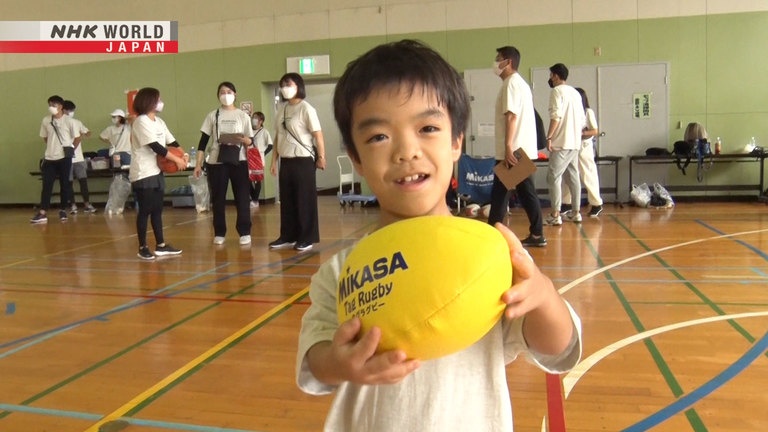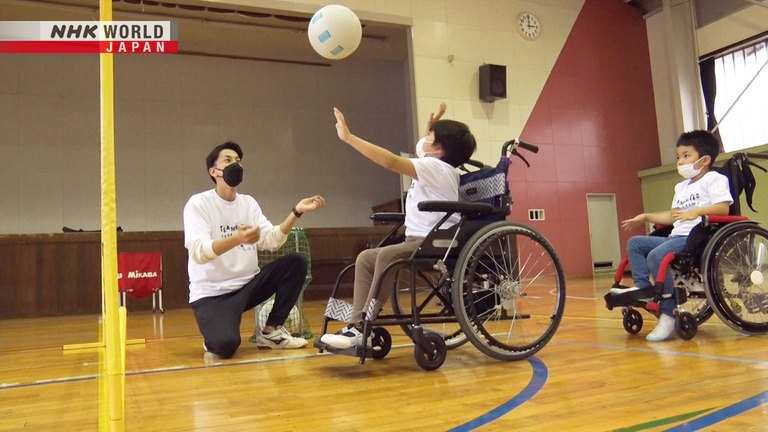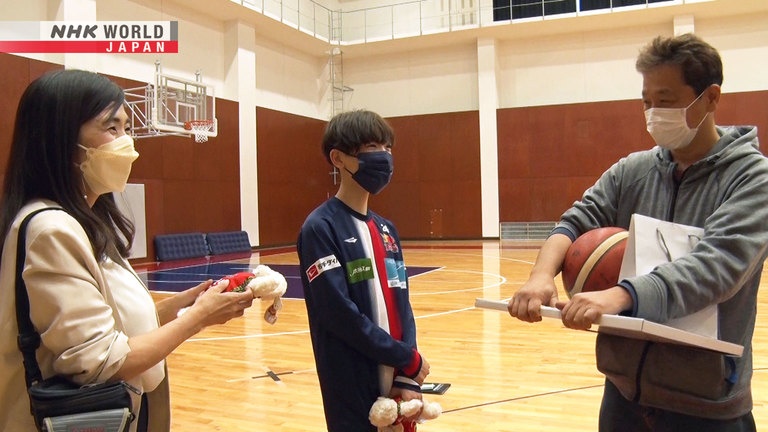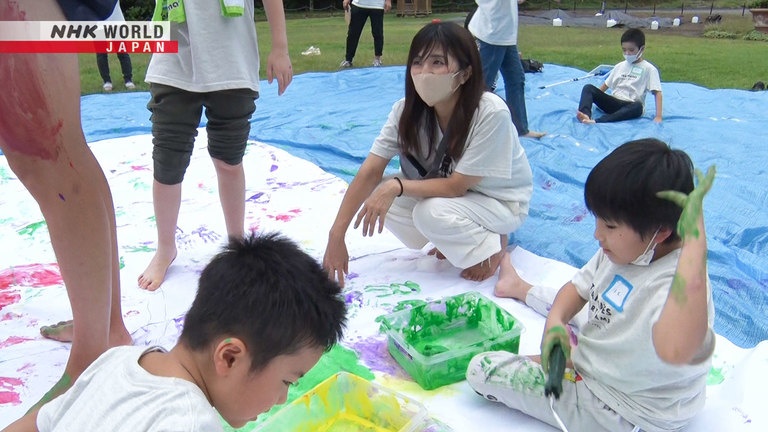Empowering Sick Children through Sports: NPO Founder - Kitano Hanako
Across Japan, over 250 thousand children consistently miss out on school and other shared peer-group experiences due to chronic medical and physical conditions. In 2016, Kitano Hanako built upon her own experiences of similar hardship to found an organization that has so far helped some 1,300 such children to unlock their potential through sports and placements with professional and university sports teams.




Transcript
"RISING"
The city of Chiba, east of Tokyo,
is home to pro baseball team, the Chiba Lotte Marines.
We find the press assembled
for the unveiling of a special new squad member.
Alongside coach Iguchi Tadahito,
emerges ten-year-old elementary school student,
and baseball fanatic, Utsunomiya Kanta.
Meet our new assistant, Kanta.
At the age of four, Kanta was diagnosed with acute lymphoid leukemia,
and has spent the six years since in and out of hospital.
Today's enrollment is part of a scheme
designed to help children with chronic medical conditions.
Kanta, can you show us the back of your shirt?
For the next six months, he'll be an official part of the squad,
assisting the players with training and matches.
Why did you choose the number ten?
Because I'm ten years old!
I hope that by giving my all, I can bring energy to my teammates.
Very reassuring. He's sharper than my players!
Kanta's mother watches on with pride.
As a family, we never thought this day would come.
I'm so happy, and so grateful to everyone around us.
The aim is to enjoy this opportunity to the fullest.
Kanta's placement was organized by an NPO
that supports young people with chronic medical needs,
led by founder Kitano Hanako.
Her "TEAMMATES" program which places
such youngsters with sports teams, began in 2017.
The scheme works with candidates aged 6 to 18,
with clearance from their regular doctors.
Across Japan, there are some 250 thousand young people
in long-term medical care.
Kitano aims to help them face the future with positivity.
And to date, this has included placements for 23 youngsters,
with 13 professional and university sports teams.
Joining these teams and taking part in all sorts of activities,
gives these children a chance to discover their own capabilities.
And I hope that through all those new encounters and experiences,
they can truly enjoy their youth in their own way.
"Empowering Sick Children through Sports" NPO Founder - Kitano Hanako
Two weeks before the press conference we saw earlier...
And to set Kanta's mind at ease ahead of the big day,
Kitano has arranged for him to meet his future teammates in advance.
Relax, everyone's so happy to see you.
But Kanta seems a little nervous
to be meeting the star coach and players
that he's only ever seen before on TV.
It's a big moment for Kitano, too.
Pleased to meet you.
I'm Kitano Hanako from Being ALIVE Japan.
Coach Iguchi Tadahito was once a player in the US Major League.
Well, everyone's here.
Kanta, can you introduce yourself?
I'm Utsunomiya Kanta.
I like playing catch ball and volleyball and video games.
Good to meet you.
First of all Kanta, congratulations on joining Chiba Lotte Marines.
I can't wait to meet you at the ground.
The team's in a rough patch right now,
but let's do our best for the next six months.
Thank you.
Once Kanta logs off, Kitano explains about his condition.
Kanta has acute lymphoid leukemia.
It's been recurring since he was four.
And he's currently in the last phase of his latest round of treatment.
A better understanding of Kanta's condition
also helps to set his new teammates at ease.
Two weeks after Kanta's official unveiling,
and he is excited to join the team
on the training ground for the first time.
Two months from now,
he'll be throwing the ceremonial first pitch at a home game.
So to prepare for the big day,
he's getting some pro tips on his throwing.
Muto, at your service.
Pleased to meet you.
If possible,
I'd like to improve my pitching action a little.
Having also recently joined a local little league team,
Kanta listens intently, eager to improve his skills.
How does the end result look?
Good job!
And to get tips on another important matter,
he seeks out young pros Yasuda Hisanori and Ojima Kazuya.
I'm nervous about my opening pitch. How do you control your nerves?
We all get nervous before a game.
So, it's not just you.
I am very nervous.
Ojima-san, you're starting today, aren't you? Are you nervous?
I sure am.
See, even Ojima-san's nervous.
Thank you.
It's only natural to be nervous.
That makes me feel a lot better.
How old are you again?
The day of the game arrives,
and some 26 thousand fans are packed into the ground.
Kitano accompanies Kanta ahead of his moment in the spotlight.
I'm so nervous.
You'll be fine.
Which bit are you nervous about?
All of it. I'm not used to being in front of so many people.
Like we said before, just think how happy you are to stand on the mound.
You are happy to be here, right?
I guess so.
Just have fun.
I know you're nervous, but it's best if you try to enjoy it.
At last, the moment of truth.
Kanta enters the field in a special car.
Welcome to fifth grader Kanta!
It's time to put what he's learned into practice.
His mission is to strike out the hitter at the home plate
18 meters away.
And his perfect pitch is welcomed by rapturous applause.
A big thank you to Kanta for the opening pitch.
I was aiming for the strike.
It was slightly off target.
But I'm glad it got there without bouncing.
But I guess this kind of experience only comes once in a lifetime.
I was as nervous as he was.
But I really wanted it to be a good experience for him.
And it's times like this that really make me realize anew
just how much potential children have.
But what was the experience
that led Kitano Hanako to go into support for ailing children?
Though initially an active child herself,
from the age of five, she began to experience fevers and chest pains,
leading to 15 years of frequent hospitalizations
with no solution in sight.
And as she grew, these episodes only became more frequent.
When things were bad, they told me to limit my physical activity.
I used to love running,
but suddenly I couldn't always do that when I wanted,
and I just had to accept it.
I used to get so frustrated about that.
Finally, in her first year of college,
they found a drug that eased her symptoms.
However...
I'd spent 15 years in all this pain, having all this treatment,
and trying all these medicines.
Then when one drug came along that solved it all,
I wondered what all those years had been for.
I began trying to figure out if there was some kind of deeper meaning.
After 15 years of constant constraints,
Kitano was left floundering for a sense of meaning.
But her father helped her through it.
My dad gave me a notebook.
And he told me to write about my experiences and my memories.
But when I started writing things down,
I couldn't really come up with anything negative.
My dad said "There were times when things got really tough,
but look at all this stuff you've achieved.
Those years weren't wasted."
And that was the moment
that finally helped me accept all my years of illness.
After college, she went to study in the US,
a bastion of progressive mental healthcare for sick children.
And while there, she encountered the therapeutic use of sports.
Back in Japan, in 2016 she launched her NPO leveraging
the power of exercise to support chronically ill young people.
Her placements with sports teams were
inspired by a similar initiative in the US.
Narusawa, Yamanashi Prefecture.
Kitano's organization is scheduled to host an overnight camp here
for young people with chronic medical needs.
She's come to check out the amenities in person.
And she's also joined by a representative of the nursing staff
who are scheduled to be on hand for the camp.
And because this is the first sleepover event that Kitano has organized,
they conduct a thorough inspection.
First, they check whether the rooms are wheelchair-accessible.
Is this room OK for wheelchair users?
We usually ask them to leave their chairs at the door,
but yes, possibly.
I suppose we could carry wheelchair users up these stairs.
That shouldn't be a problem.
In case of an emergency, what's the closest hospital?
The closest is called Narusawa Clinic.
Finally, they check out the full-sized soccer pitches
on the grounds of the facility.
Special turf helps reduce injuries.
Wow, so it's OK to fall over.
So what is the concept behind the proposed camp?
I want to help participants build friendships
that can last throughout their prolonged treatment,
including between their families.
Back in Tokyo, Kitano hosts a meeting of the athletes
who will be coaching the children during the camp,
preparing a special itinerary
that takes into account participants' capabilities.
Here's our soccer coach.
I played as a pro until four years ago.
Since then I've coached at schools while working for my old club.
He's joined by a pro rugby player,
an ex-basketball pro, and a former-beach volleyball player.
Kitano begins by filling the coaches in
on the individual children's conditions.
One child has brittle bones, another has a cranial shunt.
In all we have three kids who can't run.
But we shouldn't use that to say they can't do soccer or rugby.
We should be able to respect the children's wishes
about which sports they want to play.
Could we do tag rugby?
We do have some tags.
Do we?
Yes, we have about 20.
So we can do non-contact rugby.
A bit like playing tag.
Together, they work out various ways
to ensure the kids can enjoy a barrier-free sporting experience.
Day one of the camp arrives.
Hi, everyone.
Without worrying about what you can't do,
I hope you'll all give everything a try.
The group comprises the families of 10 youngsters aged 5 to 15,
all with long-term health conditions.
They are both excited and nervous
about this rare opportunity to experience sport.
They are free to choose whichever sports they want to try.
First up, a little volleyball practice.
Here goes!
You did great, Aki! You hit it!
There's also basketball.
Good, good!
Ah! So close!
For rugby,
Kitano joins the coach for a demonstration of how to pass backwards.
One, two, three steps. Then pass.
And when a pass goes astray, Kitano is quickly on hand.
Try again.
Nice pass!
And the coaches have their own reasons for taking part.
Let's start by holding the ball.
Since retiring from playing four years ago,
soccer coach Shimamura Tsuyoshi has been working
at his former J.League club, Shonan Bellmare.
And for the last three years,
he's been supporting children placed with the team by Kitano's NPO.
This year's arrival was 11-year-old brain tumor patient, Ono Kaede...
who is also here for the camp.
But Shimamura's interest was strengthened further by the fact
that his son was born with a serious disability.
I can really identify with the families here.
I think it was destiny that I ended up looking after our placements.
I see these kids just like my own son,
so I'm very passionate about their development.
After working up an appetite through sports practice,
they get together for a barbecue.
Yum! Yum! YUM!
I was in the hospital until yesterday.
That's right, yesterday.
So I'm really glad I got out in time.
Q: Is the camp fun?
It is fun! It's so much fun!
But he does tire easily.
But I'm still full of beans!
Also present is Shonan Bellmare intern, Ono Kaede.
And on the next table, Kitano has placed another familiar face.
He really wanted to meet you!
Utsunomiya Kanta, who arrived late at camp
due to his duties with Chiba Lotte Marines.
We're so happy to meet you!
And so begins another valuable inter-family connection.
Q: How's the food, Kanta?
It's great!
Day two of the camp.
Today, the kids will be split into teams for some competition.
First up is a child-safe game of tag rugby.
Players hang these "tags" from their waists.
When you pull on these, they come off, like so.
Then you shout out: "Tag!"
That means you've won.
Try your best to win!
Yes! I got it!
I did it!
For these children,
it's a welcome taste of the rough and tumble of rugby.
Meanwhile, Kanta gives basketball a try.
And amid the practice, friendships naturally blossom.
Q: Have you made friends here?
Yes.
There's lots of unique, or should I say "interesting" people here.
It's been great.
Soccer was fun.
And it was also fun to try rugby for the first time.
It's tough to bounce the basketball while running, but it was fun!
Sports are a way to make friends and learn cooperation.
There really are so many situations
that demonstrate the power of sports.
And I think this camp has achieved our aim
which was to forge relationships to last throughout prolonged treatment.
And this fun-packed weekend is the latest in a long track record
that has seen Kitano work with some 1,300 young people to date.
Yahaba, Iwate Prefecture.
Kitano's here to attend the farewell ceremony of another young person
who's reached the end of their placement.
I've attended every farewell ceremony so far.
It's the final day, so I try to make it if I can.
She arrives at this local sports complex...
which is home to pro basketball team, the Iwate Big Bulls.
The departing intern is 18-year-old Habashita Tengo.
Since being diagnosed five years ago with acute myeloid leukemia,
he's required regular hospital visits.
And as well as assisting with practice,
his lively personality has helped set the mood around the team.
Today's ceremony marks the end of his seven-month placement.
In front of an audience including his parents and teammates,
he gives a closing speech,
which includes a message for other young people
receiving long-term medical treatment.
I've had to come through extended medical treatment
to stand here in front of you all today.
So I hope that other young people like me can see this example
and be inspired to keep on trying.
And I also hope that one day, they too,
can make their own dreams come true.
It's always a little wistful when they reach the end of a placement.
But they stay on as supporters,
and the links to these teams don't end there.
And I hope they can take the confidence
they've gained from this initiative,
and use that to take on the next challenge in their lives.
Back in 2017, the first participant in Kitano's placement scheme
was then-seven-year-old, Hitokata Kaisei.
Another sports lover, soon after starting elementary school,
he enrolled with a local baseball team.
But not long afterwards,
he developed a condition that weakened his right thigh bone,
meaning he constantly had to wear a heavy leg brace.
He got very down about his illness.
How he still couldn't walk, or how people were staring at his leg.
He used to love running around,
so we felt really sorry to see that taken away from him.
His placement was with professional basketball team, Alvark Tokyo.
Standing on the same court as the players
as he helped with their practice helped him find new confidence.
And meeting so many new people
also helped him feel less self-conscious about his leg brace.
And five years on, he still treasures his mementos of those times.
At the end of my placement,
all the players and coaches signed this ball with messages for me.
("Remember to have fun!")
I did feel down when I found out about my illness.
But through joining the team, I got to meet lots of people.
So that was really fun.
And the experience also gave him the confidence
to take on new challenges.
My ambition is to be a scientist.
I love animals so I'd like to become a marine biologist.
I want to help to combat pollution in the ocean.
My aim is to help build a society
where there's always somebody around to help every child,
everywhere to enjoy their youth to the fullest.
And to realize this future,
Kitano Hanako is committed to empowering more and more
chronically ill young people through the power of sports.